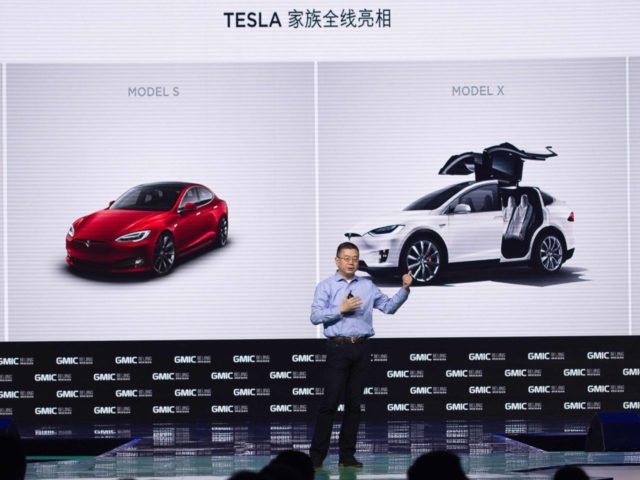Tesla’s recent announcement that it will be building a factory in China during the Communist Party’s once-every-five-years National Congress is a sign the company has become a partner with the world’s largest economy.
Tesla leaked on October 21 that it had agreed to build a factory in Shanghai’s free trade zone, the same day as General Secretary of the Communist Party Xi Jinping’s 205 minute speech to the congress.
Xi’s promises to break the “economic power of the Chinese coastal oligarchs and transfer their wealth,” so that the inland impoverished masses can enjoy a “vast technology-based economy” that features high consumption, was uniquely enshrined into the Chinese constitution as “socialism with Chinese characteristics for a new era.” The only other Chinese leaders to achieve that demonstration of total control were China’s revolutionary founder Mao Zedong and his protégé Deng Xiaoping.
Mao united China with a brutal dictatorship that killed millions through political oppression and starvation, and then Deng shifted course by telling Chinese to embrace getting rich through state sponsored capitalism. According to George Friedman of Geopolitical Futures, Xi’s speech signaled that China’s immense capital flow to expand state-owned enterprises will be redirected into higher wages and entitlement payments so the inland poor can increase consumption.
China is by far the world’s largest automotive market, with a share of 30 percent. Ordinary Chinese were not allowed to buy cars before the 1980s, but last year’s internal production was up about 15 percent, to 28.1 million units. Internal sales were up 14 percent, to 28 million units. China has also been a net exporter of vehicles since 2011.
Tesla exported 13 percent, or about $1 billion, of its vehicle production to China last year. The main reason that number was not much higher is China’s 21 to 30 percent tariff on vehicle imports, versus the U.S. automotive import tax of 2.5 percent.
The combination of prohibitively high tariffs and massive amounts of state-owned-bank funding to state-owned-enterprises explains why China’s automotive production base counts more than 75 original equipment manufacturers and 184 vehicle assembly plants.
But due to poor Chinese quality, total U.S. auto industry exports to China have grown 65 percent over the last five years. China’s National Development and Reform Commission called the government firms “zombie-automakers,” because they continue to borrow from state-owned banks to expand, despite 20 percent overcapacity and massive losses.
The financial structure of Tesla’s Shanghai factory was not disclosed. But what is very compelling to Xi’s socialism “for a new era” is CEO Elon Musk’s ability to finance all of Tesla’s operations without Chinese government loan guarantees or subsidies.
China’s vice minister of industry and information technology, Xin Guobin, stated at a September 11 auto forum that his ministry has begun work on a timetable to phase out fossil fuel vehicles. Chinese consumers got the message, and September plug-in vehicle sales spiked by 79 percent to 78,000 units — more than the U.S. sold in all of 2016.
Ministry of Finance deputy section chief Song Qiuling told auto forum attendees that although the key to China’s plug-in sales dominance has been subsidies up to half of the original vehicle price, “such subsidies may lead to blind expansion by auto makers.”
Tesla’s Musk told Chinese officials that the company had expected China to account for 30-35% of sales the Model S in 2014, but that the tariff kept that number under 10 percent. He estimates that Tesla, by opening a China plant, will be able to cut costs by over a third.

COMMENTS
Please let us know if you're having issues with commenting.